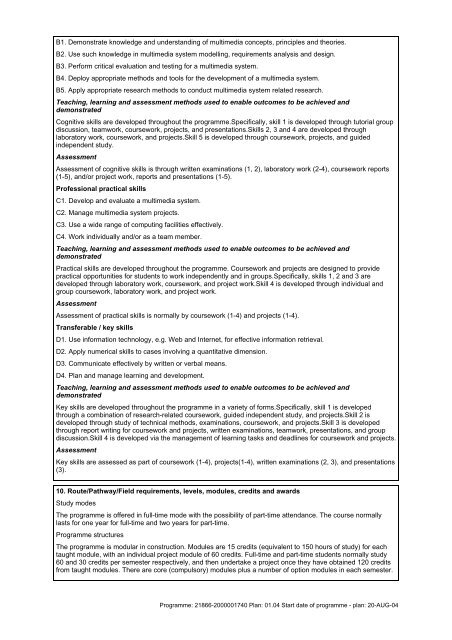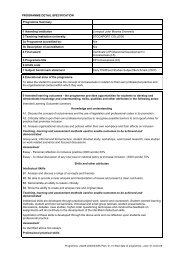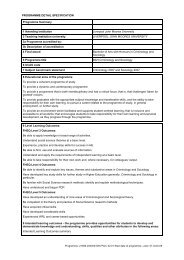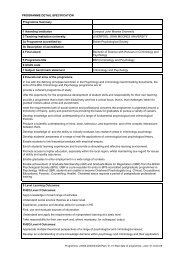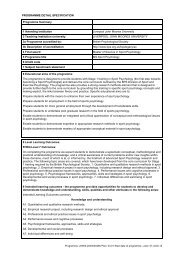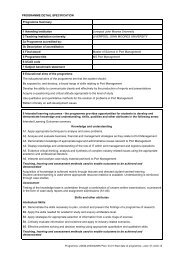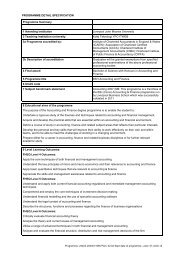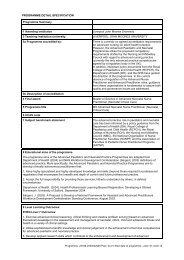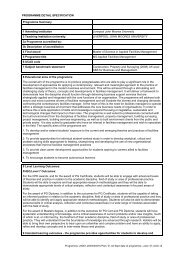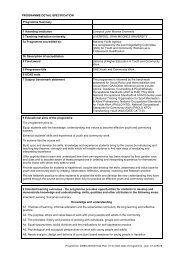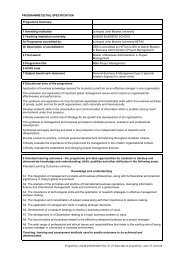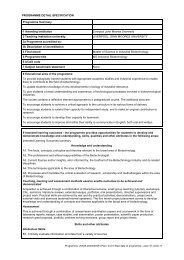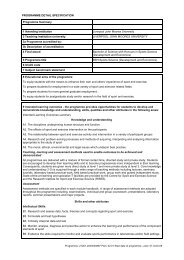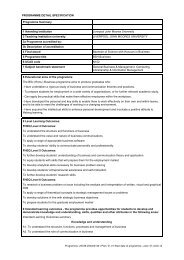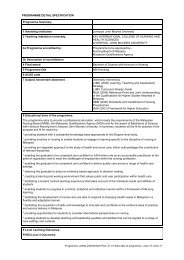Multimedia Computing - Liverpool John Moores University
Multimedia Computing - Liverpool John Moores University
Multimedia Computing - Liverpool John Moores University
Create successful ePaper yourself
Turn your PDF publications into a flip-book with our unique Google optimized e-Paper software.
B1. Demonstrate knowledge and understanding of multimedia concepts, principles and theories.<br />
B2. Use such knowledge in multimedia system modelling, requirements analysis and design.<br />
B3. Perform critical evaluation and testing for a multimedia system.<br />
B4. Deploy appropriate methods and tools for the development of a multimedia system.<br />
B5. Apply appropriate research methods to conduct multimedia system related research.<br />
Teaching, learning and assessment methods used to enable outcomes to be achieved and<br />
demonstrated<br />
Cognitive skills are developed throughout the programme.Specifically, skill 1 is developed through tutorial group<br />
discussion, teamwork, coursework, projects, and presentations.Skills 2, 3 and 4 are developed through<br />
laboratory work, coursework, and projects.Skill 5 is developed through coursework, projects, and guided<br />
independent study.<br />
Assessment<br />
Assessment of cognitive skills is through written examinations (1, 2), laboratory work (2-4), coursework reports<br />
(1-5), and/or project work, reports and presentations (1-5).<br />
Professional practical skills<br />
C1. Develop and evaluate a multimedia system.<br />
C2. Manage multimedia system projects.<br />
C3. Use a wide range of computing facilities effectively.<br />
C4. Work individually and/or as a team member.<br />
Teaching, learning and assessment methods used to enable outcomes to be achieved and<br />
demonstrated<br />
Practical skills are developed throughout the programme. Coursework and projects are designed to provide<br />
practical opportunities for students to work independently and in groups.Specifically, skills 1, 2 and 3 are<br />
developed through laboratory work, coursework, and project work.Skill 4 is developed through individual and<br />
group coursework, laboratory work, and project work.<br />
Assessment<br />
Assessment of practical skills is normally by coursework (1-4) and projects (1-4).<br />
Transferable / key skills<br />
D1. Use information technology, e.g. Web and Internet, for effective information retrieval.<br />
D2. Apply numerical skills to cases involving a quantitative dimension.<br />
D3. Communicate effectively by written or verbal means.<br />
D4. Plan and manage learning and development.<br />
Teaching, learning and assessment methods used to enable outcomes to be achieved and<br />
demonstrated<br />
Key skills are developed throughout the programme in a variety of forms.Specifically, skill 1 is developed<br />
through a combination of research-related coursework, guided independent study, and projects.Skill 2 is<br />
developed through study of technical methods, examinations, coursework, and projects.Skill 3 is developed<br />
through report writing for coursework and projects, written examinations, teamwork, presentations, and group<br />
discussion.Skill 4 is developed via the management of learning tasks and deadlines for coursework and projects.<br />
Assessment<br />
Key skills are assessed as part of coursework (1-4), projects(1-4), written examinations (2, 3), and presentations<br />
(3).<br />
10. Route/Pathway/Field requirements, levels, modules, credits and awards<br />
Study modes<br />
The programme is offered in full-time mode with the possibility of part-time attendance. The course normally<br />
lasts for one year for full-time and two years for part-time.<br />
Programme structures<br />
The programme is modular in construction. Modules are 15 credits (equivalent to 150 hours of study) for each<br />
taught module, with an individual project module of 60 credits. Full-time and part-time students normally study<br />
60 and 30 credits per semester respectively, and then undertake a project once they have obtained 120 credits<br />
from taught modules. There are core (compulsory) modules plus a number of option modules in each semester.<br />
Programme: 21866-2000001740 Plan: 01.04 Start date of programme - plan: 20-AUG-04


